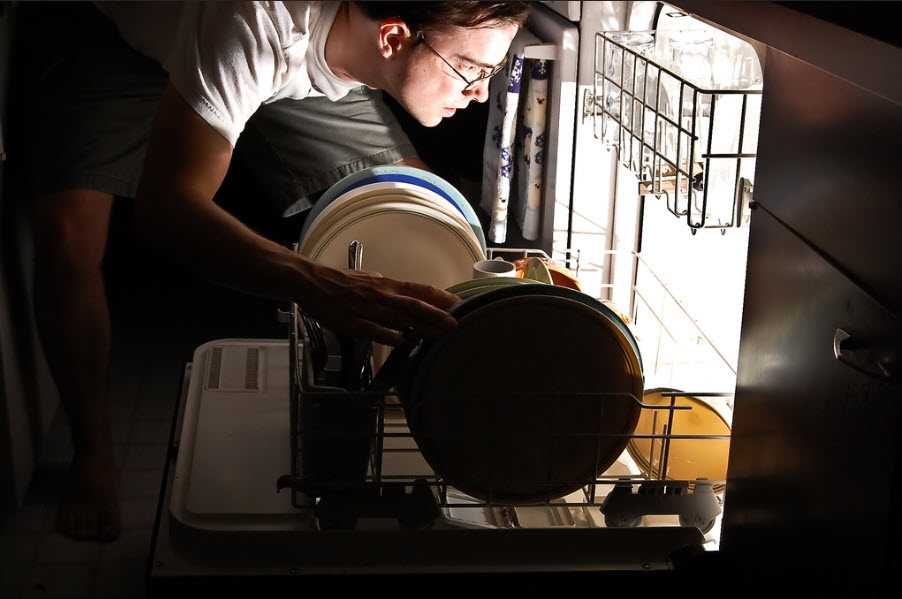If you’re like most people, you probably assume your dishwasher cleans itself every time it runs. After all, it’s spraying hot water and soap, right?
Not quite.
Over time, food particles, grease, soap scum, and hard water minerals build up inside your dishwasher. This gunk can clog filters, reduce performance, leave your dishes less than sparkling and even cause foul odors or bacterial growth. Without regular maintenance, this grime can lead to costly breakdowns or the need for replacement parts.
Dishwasher Maintenance: Monthly Cleaning & Smart Usage Tips
Your dishwasher does a lot more than just make your plates sparkle it saves water, energy, and time. But to keep it performing at its best, it needs regular upkeep. Here’s what you should know about monthly maintenance, best practices for loading dishes, and some surprising facts about dishwasher usage in American homes.
🔄 How to Do a Monthly Dishwasher Cleaning
You don’t always need a full deep clean. For your monthly maintenance routine, do the following:
✅ Monthly Checklist:
- Wipe down all surfaces, especially the door gasket and corners where grime can build up.
- Remove obvious goop and food debris from inside the tub.
- Clean the filter lightly, removing large debris (no need to take it apart unless you notice performance issues).
- Use a premium dishwasher cleaner, as recommended by most manufacturers. Many modern detergent pods also include built-in cleaning agents for your machine.
💡 Skip the vinegar cleanse unless you’re doing a seasonal deep clean or notice staining, buildup, or odors. Overuse of vinegar can wear down rubber components over time.
🍽️ Should You Rinse Dishes Before Loading?
You may be surprised, but pre-rinsing is unnecessary and sometimes harmful.
Here’s why:
- It wastes water and energy.
- Modern dishwashers are built to detect soil levels. If you rinse too well, your machine may think the dishes are already clean and deliver a weaker wash.
- Detergents are designed to bind with grease and food particles. Without them, the detergent can create excess foam, which may damage the appliance.
✅ Just scrape off large food particles before loading. That’s all your dishwasher needs to run effectively.
📊 How Often Do Americans Actually Use Their Dishwashers?
According to the U.S. Energy Information Administration (EIA):
- Only 67.4% of U.S. homes had a dishwasher as of their last major study.
- Of those homes:
- 14% never used them
- 11.3% used them only once a week
- The largest group 22% used them two to three times per week
That makes the dishwasher one of the least used major appliances in American households.
💡 Dishwasher vs. Handwashing: Which Saves More?
Handwashing uses more water, more energy, and more effort. Here’s a comparison:
| Method | Water Used | Energy Used |
|---|---|---|
| Handwashing | ~40 gallons | ~3.5 kWh |
| Dishwasher | 4–5 gallons | 0.5–1.3 kWh |
➡️ Just 10 handwash cycles use more energy than it takes to manufacture a dishwasher.
So not only is a dishwasher more eco-friendly, but it also helps you save on utility bills and time.
🧼 Why Dishwasher Maintenance Matters
- Improves cleaning performance
- Extends appliance lifespan
- Reduces risk of clogs or breakdowns
- Eliminates unpleasant smells
- Prevents mold, fungi, and bacterial buildup
In fact, a study published by the National Center for Biotechnology Information found that dishwashers can harbor bacteria and fungi if not properly cleaned posing a hidden risk to your health.
✔️ Simple Steps to Keep Your Dishwasher Running Like New
- Clean the Filter (Monthly)
Remove the lower rack and check the drain for debris. Unscrew and rinse the filter under hot water. Use a soft brush to scrub off any stuck-on particles. - Wipe Down the Door Seals
Grease and grime can build up around the door gasket. Wipe it clean with a damp cloth and a little white vinegar or mild detergent. - Run a Vinegar Wash (Monthly)
Place a cup of white vinegar in a dishwasher-safe container on the top rack. Run a hot water cycle with no dishes. This helps remove grease and odors. - Use Baking Soda for Freshness
Sprinkle a cup of baking soda across the bottom and run a short cycle. It will help with deodorizing and brightening the interior. - Check Spray Arms
Every few months, inspect spray arms for clogs. Use a toothpick or pin to remove any debris blocking the nozzles. - Descale with Dishwasher Cleaner
If you live in a hard water area, use a descaling product every 2–3 months to prevent mineral buildup and keep components running smoothly.
🛡️ Keep Appliances Clean and Covered
Routine maintenance like this can help avoid unexpected repair bills but even the best appliances can break down.
That’s where Prestige Home Guard comes in. We offer coverage that protects your home’s essential systems and appliances including dishwashers so you’re not stuck with a hefty bill when things go wrong.










